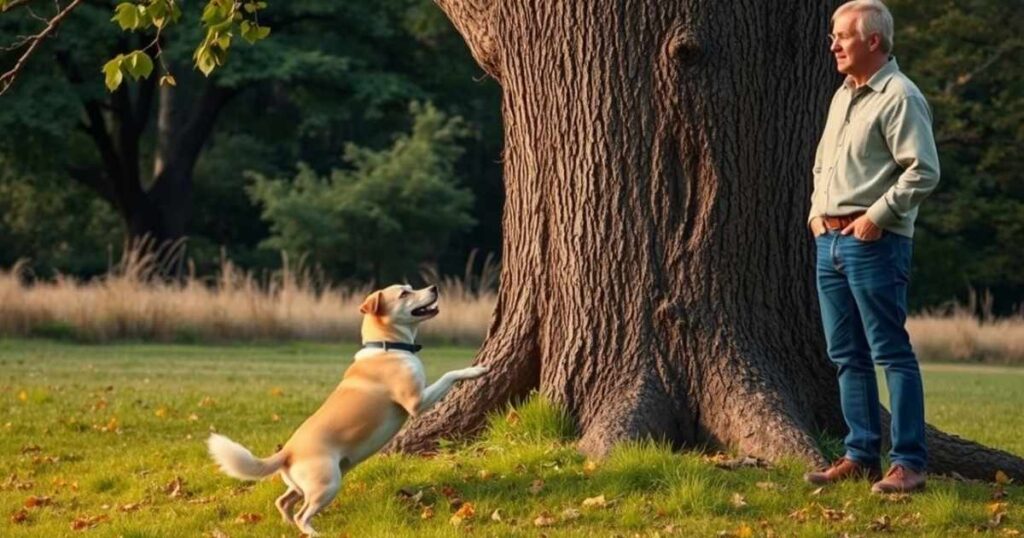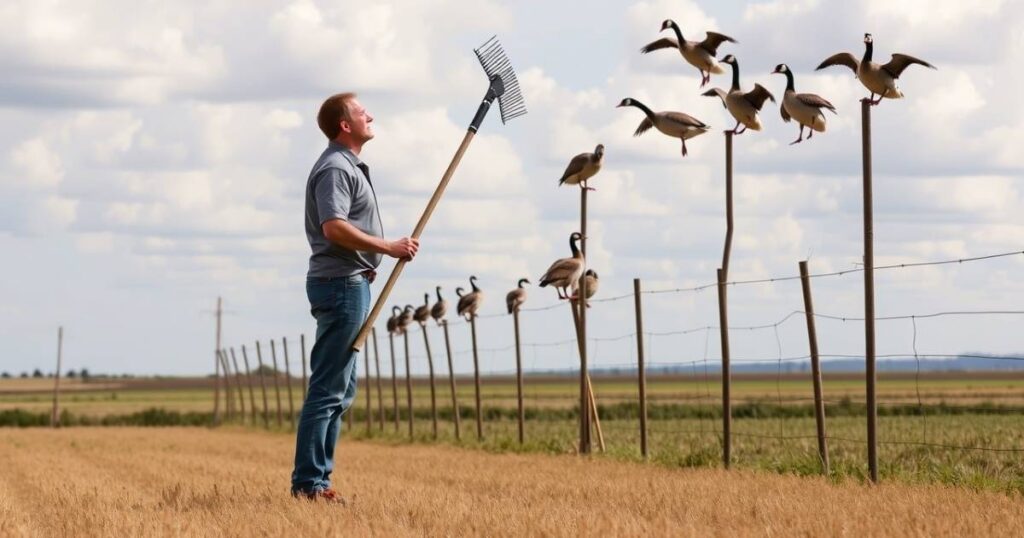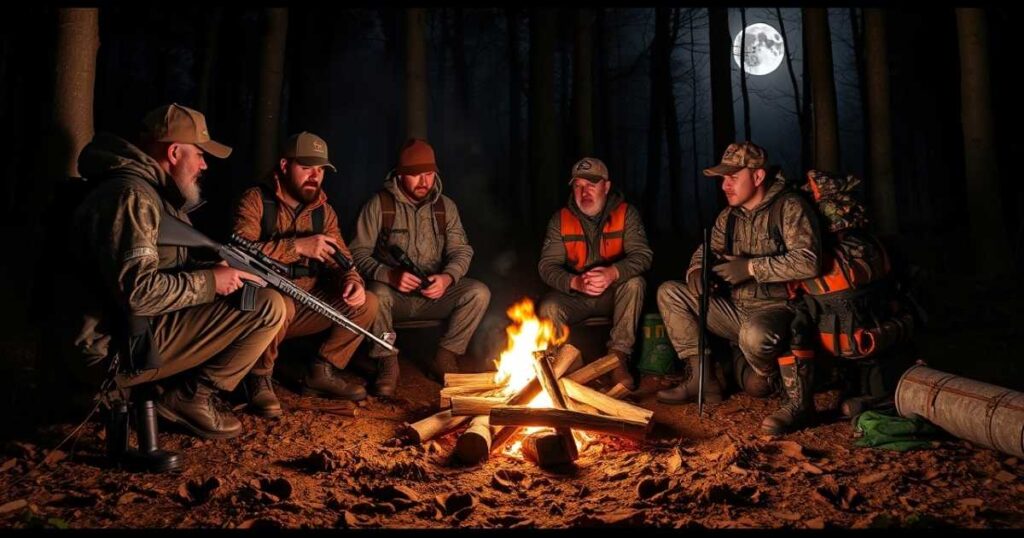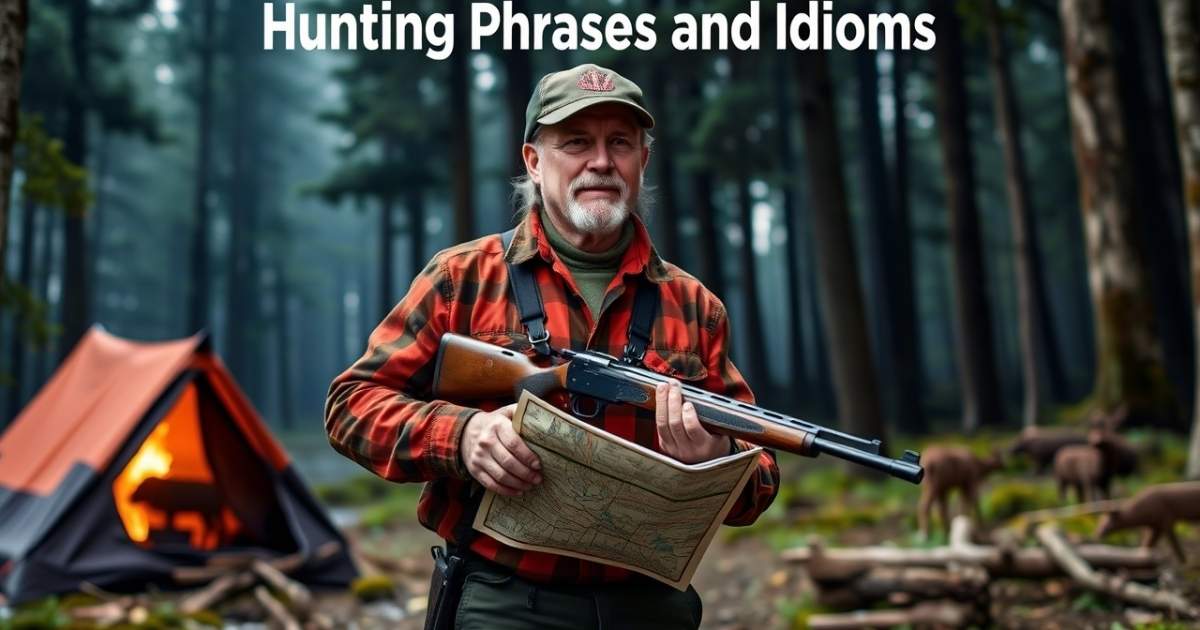Hunting Phrases and Idioms are commonly used in everyday language to describe pursuit, competition, and determination. These hunting phrases come from real hunting experiences, making them rich in meaning. Whether you’re tracking a goal or chasing a dream, cool hunting phrases help express persistence and strategy. People use hunting idioms like “bark up the wrong tree” or “keep at bay” to describe mistakes or control situations. Many hunting sayings are also used in business, sports, and daily conversations to emphasize effort and patience.
If you love language, you’ll enjoy these hunting sayings and quotes that bring color to communication. From “hotshot” to “fair game”, hunting phrases and idioms make speech more interesting. Whether it’s about determination or deception, hunting idioms add depth to stories and discussions. Learning cool hunting phrases helps you sound natural and confident in any conversation.
Complete List of “Hunting” Phrases and Idioms
The Complete List of “Hunting” Phrases and Idioms includes expressions related to pursuit, competition, and strategy. These idioms, such as “bark up the wrong tree” and “keep at bay”, add depth to conversations. Understanding these phrases helps improve communication in both casual and professional settings.
Call off the dogs
Meaning: Stop someone from behaving aggressively toward another person.
Example: Call off the dogs, Mike. He’s learned his lesson already.
Hotshot
Meaning: A highly talented or confident person, often in a boastful way.
Example: He thinks he’s a real hotshot just because he closed one big deal.
Bark up the wrong tree

Meaning: Pursue the wrong course of action or make a mistaken assumption.
Example: If you think I stole your keys, you’re barking up the wrong tree.
Hound someone
Meaning: Repeatedly bother or pressure someone.
Example: Reporters kept hounding the celebrity for a statement.
Long shot
Meaning: Something that has a very small chance of success.
Example: Winning the lottery is a long shot, but I’ll try anyway.
Not by a long shot
Meaning: Not even close or far from being true.
Example: The project isn’t finished, not by a long shot!
Keep at bay
Meaning: Prevent something or someone from coming too close or causing harm.
Example: She took vitamins to keep illness at bay during flu season.
Sitting duck
Meaning: A vulnerable or easy target.
Example: Without security, the store was a sitting duck for thieves.
Be in the hunt
Meaning: Have a chance of winning or succeeding.
Example: Despite a slow start, the team is still in the hunt for the championship.
Run rings around
Meaning: Greatly outperform or outmaneuver someone.
Example: The young chess player ran rings around his experienced opponent.
Have a dog in the hunt
Meaning: Have a personal stake or interest in something.
Example: I don’t have a dog in the hunt, so I’ll stay out of the debate.
Hunt for (someone or something)
Meaning: Search for a person or object.
Example: She’s been hunting for the perfect wedding dress for weeks.
Hunt after (someone or something)
Meaning: Pursue someone or something persistently.
Example: He’s been hunting after a promotion for years.
Hunt high and low (for someone or something)
Meaning: Search everywhere with great effort.
Example: I hunted high and low for my lost keys but couldn’t find them.
Hunt through (something) (for something)
Meaning: Search thoroughly in a place for a specific item.
Example: She hunted through her bag for her missing keys.
Hunting and pecking
Meaning: Searching or typing in an uncoordinated, slow manner.
Example: He’s not good with computers, he’s still hunting and pecking at the keyboard.
Hunt the gowk
Meaning: A Scottish term for being sent on a fool’s errand.
Example: They tricked the new guy into hunting the gowk for a “left handed screwdriver.”
Related Guide:
Affirm Vs Confirm In English: 10 Differences You Need To Know
Run with the hare and hunt with the hounds
Meaning: Try to support both sides in a conflict, often hypocritically.
Example: You can’t run with the hare and hunt with the hounds, you need to pick a side.
Hunt someone or something down
Meaning: Search for and find someone or something, often with great effort.
Example: The police hunted down the suspect after a long chase.
Hunt someone or something out
Meaning: Discover or track down something hidden or hard to find.
Example: She hunted out the perfect vintage jacket in a thrift store.
The/(one’s) old hunting grounds
Meaning: A familiar place one used to visit or frequent.
Example: He returned to his old hunting grounds to catch up with childhood friends.
Happy hunting ground
Meaning: A place where one is likely to find success or abundance.
Example: For antique collectors, that flea market is a happy hunting ground.
Be on a witch hunt
Meaning: To search for and accuse people unfairly, often based on fear or suspicion.
Example: The media was on a witch hunt, blaming innocent people for the scandal.
That old dog won’t hunt (old-fashioned, US)
Meaning: An idea or argument that won’t work or isn’t valid.
Example: You can try to blame traffic for being late, but that old dog won’t hunt.
Hunt where the ducks are
Meaning: Focus efforts where success is most likely.
Example: If you want more customers, advertise online, hunt where the ducks are.
Snipe hunt
Meaning: A futile or deceptive search, often as a prank.
Example: They sent the rookie on a snipe hunt for a “left-handed wrench.”
Grinning like a shot fox
Meaning: Smiling in a smug, sly, or foolish way.
Example: After pulling off the prank, he was grinning like a shot fox.
Tall enough to hunt geese with a rake

Meaning: Very tall.
Example: That kid had a growth spurt, he’s tall enough to hunt geese with a rake!
Fair game
Meaning: Someone or something that is a legitimate target for criticism, attack, or pursuit.
Example: Once a politician enters the race, they’re fair game for tough questions.
Additional notes
Hunting Phrases and Idioms are widely used in everyday speech, business, and storytelling. These expressions often describe pursuit, strategy, or competition, reflecting the skills needed for real hunting. Many of these idioms have evolved to fit modern contexts while retaining their original meanings.
Some Hunting Phrases and Idioms emphasize persistence and determination. Expressions like “hunt high and low” or “be in the hunt” highlight an active search for success or opportunity. Such phrases are common in competitive environments, including sports and business.
Others focus on aggression or pressure, often symbolizing relentless pursuit. Idioms like “hound someone” or “call off the dogs” illustrate situations where people are being chased, criticized, or pressured. These expressions convey urgency and intensity in conversations.
Several Hunting Phrases and Idioms relate to deception or misdirection. Terms like “snipe hunt” or “witch hunt” describe situations where people are led astray or unfairly targeted. These idioms highlight the risk of being tricked or accused without proper reason.
Regional and historical influences have shaped many Hunting Phrases and Idioms over time. Expressions like “that old dog won’t hunt” originate from Southern U.S. culture, emphasizing failed plans. Understanding these idioms enhances communication, making speech more vivid and expressive.
Hunt (verb)
Meaning: To search for, chase, or pursue something, often for survival or gain.
Example: The wolves hunt in packs to take down larger prey.
Hunt (noun)
Meaning: The act of searching or pursuing something, often in a determined manner.
Example: The treasure hunt led them through the entire city.
Here I have provided for you the essential hunting vocabulary in the form of 4 notes:
1. Hunting Phrases in Everyday Language
- Many hunting-related idioms describe persistence, strategy, or pursuit (e.g., “hunt high and low”, “keep at bay”).
- Others highlight aggression or pressure (e.g., “call off the dogs”, “hound someone”).
2. Hunting Phrases in Business & Competition
- Success often relates to hunting analogies, like “be in the hunt”, meaning a contender for success.
- Sales and marketing use “hunt where the ducks are”, emphasizing targeting the right audience.
3. Hunting Phrases in Trickery & Deception
- “Snipe hunt” refers to a pointless or deceptive task, often as a prank.
- “Hunt the gowk” is a Scottish phrase for being sent on a fool’s errand.
4. Old-Fashioned or Regional Hunting Expressions
- The Southern U.S. idiom “that old dog won’t hunt” means an argument or idea won’t work.
- “Grinning like a shot fox” describes a sly or foolish smile.
20 Points About Using Hunting Phrases

- Hunting idioms are widely used in business, sports, and everyday conversations.
- Many hunting expressions originate from survival and tracking skills.
- Some phrases convey persistence (e.g., “hunt high and low”).
- Others warn of mistakes (e.g., “bark up the wrong tree”).
- Certain hunting terms describe aggression or relentless pursuit (“hound someone”).
- Metaphors of competition often use hunting language (“be in the hunt”).
- Deception-related phrases include “snipe hunt” and “hunt the gowk”.
- Regional expressions (like “that old dog won’t hunt”) are more common in certain areas.
- Historical hunting culture influenced many of these phrases.
- Some hunting idioms overlap with war and strategy (“keep at bay”).
- Technology and modern business have adapted some hunting terms (e.g., headhunting in recruitment).
- Hunting phrases often appear in storytelling, emphasizing pursuit or challenge.
- “Run with the hare and hunt with the hounds” criticizes hypocrisy or double-dealing.
- “Fair game” refers to someone open to criticism or attack.
- “Hunt through” describes searching thoroughly for something.
- Idioms like “happy hunting ground” can have different meanings in different contexts.
- Sports commentary frequently uses hunting phrases (e.g., “long shot”, meaning an unlikely success).
- Persistence-related phrases often encourage determination (“hunt after a goal”).
- Some phrases, like “witch hunt,” have evolved to mean unfair persecution.
- Understanding hunting phrases can improve communication in professional and casual settings.
FAQ’s
What are some common sayings related to hunting?
Many Hunting Phrases and Idioms describe pursuit, strategy, and patience, like bark up the wrong tree or keep at bay, adding meaning to conversations.
How do hunting-related expressions make speech more interesting?
Using Hunting Phrases and Idioms adds color and depth to communication, making everyday language more engaging and relatable in both casual and professional settings.
Why do people use phrases inspired by hunting?
People use Hunting Phrases and Idioms to express determination, competition, and cleverness, reflecting real-life challenges in sports, business, and personal situations.
Can hunting expressions be used in business and sports?
Yes, Hunting Phrases and Idioms work well in business and sports, highlighting competition, persistence, and strategy, making communication more impactful and motivating.
Are there humorous phrases related to hunting?
Many Hunting Phrases and Idioms bring humor, like grinning like a shot fox, adding a playful touch to conversations while keeping their original meaning intact.
Conclusion
Hunting Phrases and Idioms make conversations more vivid and engaging. These hunting phrases help describe pursuit, strategy, and determination in a way that connects with real life experiences. Whether you’re using cool hunting phrases like “run rings around” or classic hunting idioms like “call off the dogs”, they add depth to your speech. Many hunting sayings also bring wisdom and humor, making them great for storytelling. Learning hunting sayings and quotes can improve how you express ideas in everyday conversations.
From motivation to competition, Hunting Phrases and Idioms fit many situations. Business, sports, and even casual talks become more interesting with hunting phrases. Using cool hunting phrases like “long shot” or “fair game” makes you sound more natural and expressive. These hunting idioms help you communicate with confidence and style. Keep exploring hunting sayings and quotes to enrich your vocabulary effortlessly!

Zion Blaze is a dedicated administrator with 5 years of experience in managing operations, optimizing workflows, and ensuring efficiency. Skilled in leadership, problem-solving, and team coordination.

